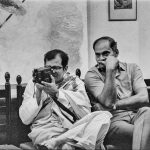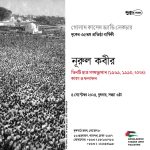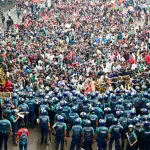By Rahnuma Ahmed
In “The truths and lies of 9/11. Do they concern us?” (see attachment) — a nearly 13,000-word article written on the occasion of New Age‘s 9th anniversary — I respond first to allegations of being a “conspiracy theorist” advanced by a Facebook commenter nearly a year ago, and most recently, by a Dhaka-based British journalist. These allegations, I argue, reflect an appalling ignorance of critical analyses of the American system and the growing body of serious, academic scholarship on 9/11. They make me wonder what is it that makes the US government account of 9/11 “sacrosanct.” Of why, one can question the existence of God but not the truth of the official narrative. These allegations also beg the question, whose interests do those who, knowingly or unknowingly, parrot accusations of “conspiracy theory” serve?
The titles of the sections that follow give an indication of what I discuss: (ii) Conceptual flaws of the epithet “conspiracy theory” (iii) A studious ignorance of 9/11 scholarship (iv) Psychological explanations for ‘conspiracy phobia’ (v) Perspectives on 9/11 in Bangladesh (vi) Studiously ignoring the implications for Bangladesh.
Of how “conspiracy” — the collusion of two or more people pursuing illegal means to effect some illegal or immoral end — is a recognised concept in law; of how, the slur “conspiracy theorist”, appears to be the most powerful ideological tool operating to de-legitimise any questions that contest the official account of 9/11.
Studies conducted by academic dissenters in the US which contest the official account of 9/11 have grown over the last decade; many, however, repeatedly pay the price of dissent by being slandered as kooks, wackos, conspiracy theorists; a few, have lost their tenurial positions. Some 9/11 whistleblowers with first hand information have seemingly paid a heavier price, dying reportedly, under “questionable circumstances.”
Psychological studies post-9/11 have confronted the question of what prevents people from processing information which “challenges preexisting assumptions about government, dissent, and public discourse in a democratic society.” Findings indicate that strong emotions are aroused when people are reminded of 9/11, making them vulnerable to government and mainstream media efforts aimed at manipulating the behaviour of citizens. Research indicates that the label “conspiracy theorist” allows people to sidestep sound scholarly and journalistic practices, to avoid examining the evidence from outside the “ruling-group mind”, as do architects, engineers, chemistry professors and demolition experts who insist that the Twin Towers and Building 7 were brought down by controlled demolition.
Professor Ahmed Kamal (historian) while concluding his presidential address at a discussion in Dhaka after the invasion of Afghanistan (keynote paper, “Crusade, Jehad o Sreni Shongram”, ?presented by Farhad Mazhar), had uttered these prophetic words,
With the September 11 attack on America, people have lost their right to discover the truth. Truth now belongs to institutions. From now on, the TV, the newspapers, the government, the [political] party will tell us what is true… Our struggle, therefore,? must include the freedom to discover the truth, actually, our struggle must be about protecting our right to discover the truth.
But for the intellectual community in Bangladesh struggling to discover the truth independently is not easy, for, we, as members of the bhodro shomaj , are mired in a past which has interpreted colonial history through frameworks that have helped to inhibit us from “lending support to the struggle against imperialism” (Salimullah Khan). Old habits die hard, disputing, dissenting, challenging and contesting the master narrative of 9/11 provided in US government accounts, talking back to white westerners who wield power and authority, whether at home or abroad, is a rarity.
But in the context of an unending and ever-expanding war globally, with the US military having developed strategic interests in the Bay of Bengal, with the presence of US Special Forces in Bangladesh (disclosed not by our government but through a US Congressional hearing), with reports of torture being outsourced to Bangladesh (British citizen Jamil Rahman has alleged that he was tortured by military intelligence in the presence of MI5 officials in Dhaka who wanted him to confess to being the mastermind of the 7/7 London bombings), the silence of members of Bangladesh’s intellectual community — defined by Edward Said as being those who “exercise…[a] critical and relatively independent spirit of analysis and judgment” — raises serious questions about their integrity, about how they view their social responsibility.
In 2001, we were afraid that being anti-imperialists implied that “we support[ed] the Taleban” (Salimullah Khan); and the Taliban, as UK’s then prime minister Tony Blair had insisted, has “virtually merged with the al-Qaeda network”( CNN’s Larry King Live, November 6, 2001).
But with credible reports emerging now that NATO powers airlifted al-Qaeda fighters into Libya (2011) and Syria (2011-2012), with FBI whistleblowers’ insisting that Osama bin Laden was a CIA asset right up until 9/11, one is forced to wonder whether at issue is our psychological and intellectual inability to process this new information and re-think the master narrative about 9/11, or whether the problem lies in being publicly afraid to acknowledge what we privately know to be true.
Decolonising the mind is not an easy task, it has material consequences, a loss of privilege, of status and connections.
Download the full article:?TheTruths&LiesOf9-11.DoTheyConcernUs 2
——————
“The truths and lies of 9/11. Do they concern us?”, published in New Age, 9th Anniversary Special (theme: Democracy. Discovering the Commons), Wednesday, August 8, 2012





Leave a Reply
You must be logged in to post a comment.